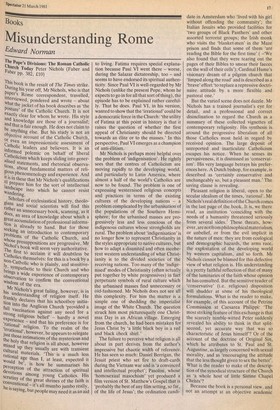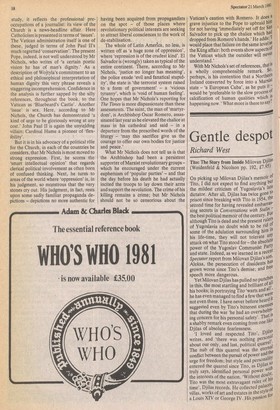B ooks
Misunderstanding Rome
Edward Norman
The Pope's Divisions: The Roman Catholic Church Today Peter Nichols (Faber and Faber pp. 382, £10) This book is the result of The Times strike. boring his year off, Mr Nichols, who is that paper's Rome correspondent, travelled, interviewed, pondered and wrote — about What the jacket of his book describes as `the Posture' of the Catholic Church. It is not exactly clear for whom he wrote. His style and knowledge are those of a journalist; and that is fair enough. He does not claim to be anything else. But his study is not an objective account of the Catholic Church, OF even an impressionistic assessment of Catholic leaders and believers. It is an informed polemic on behalf of liberal Catholicism which keeps sliding into generalised statements, and rhetorical observatiens, about fundamental matters of religious phenomenology and experience. And it is in these that Mr Nichols's qualifications ill prepare him for the sort of intellectual landscape into which he cannot resist wandering. Scholars of ecclesiastical history, theologians and social scientists will find this rather an unnecessary book, scanning, as it does, an area of knowledge about which a great accumulation of professional information is already to hand. But for those seeking an introduction to contemporary problems of the Catholic Church, and Whose presuppositions are progressive, Mr Nichol's book will seem very authoritative. The first to acclaim it will doubtless be Catholics themselves: for this is a book by a non-Catbolic who is plainly, and sensitive1Y, sympathetic to their Church and who brings a wide experience of contemporary observation to confirm the conventional wisdom of the era. , Nichols's great failing, however, is in his understanding of religion itself. He frankly declares that his schoolboy initiation into the Anglican Church `provided a full vaccination against any need for a strong religious belief' — hardly a novel experience — and that his preference is for 'rational' religion. To the realm of the `irrational', however, he appears to relegate Just those intimations of the mysterious and the holy that religion'is all about, however mixed up they usually are with transient cultural materials. `This is a much less rational age than I, at least, expected it would be', is how he summarises his Perception of the attraction of spiritual devotions among young Catholics. His scrutiny of the great shrines of the faith is conventional — it's all mumbo jumbo really, he is saying, but people may need it as an aid to living. Fatima requires special explanation because Paul VI went there — worse, during the Salazar dictatorship, too — and seems to have endorsed its spiritual authenticity. Since Paul VI is well-regarded by Mr Nichols (unlike the present Pope, whom he expects to go in for all that sort of thing), the episode has to be explained rather carefully. That he does. Paul VI, in his version, wanted to show that the `irrational' could be a democratic force in the Church: `the utility of Fatima at this point in history is that it raises the question of whether the first appeal of Christianity should be directed towards an elite or to the masses.' In this perspective, Paul VI emerges as a champion of anti-elitism.
Mr Nichols is perhaps more helpful over the problem of indigenisation'. He rightly sees that the centres of Catholicism are moving rapidly to the developing world, and particularly to Latin America, where almost a half of the world's Catholics are now to be found. The problem is one of ' expressing westernised religious concepts and practices in terms of the existing cultures of the developing nations — a problem complicated by the urbanisation of the populations of the Southern Hemisphere; for the urbanised masses are progressively less and less concious of the indigenous cultures whose strongholds are rural. The problem about indigenisation' is no longer how to represent Christianity in the styles appropriate to native cultures, but how to adapt a disunited and often incoherent western understanding of what Christianity is to the divided societies of the receiving nations. Too many of the Indigenised' modes of Christianity (often actually put together by white progressives) in fact perpetuate symbols of rural culture which the urbanised masses find unnecessary or old-fashioned. Mr Nichols does not see all this complexity. For him the matter is a simple one of shedding the imperialist image of the White Church. The question struck him most picturesquely one Christmas Day in an African village. Emerging from the church, he had been mistaken for Jesus Christ by 'a little black boy in a red and black check shirt.'
The failure to perceive what religion is all about in part derives from the author's impressive but chaotic width of reference. He has seen so much: Daniel Berrigan, the Jesuit priest who set fire to draft-cards during the Vietnam war and is `a convinced and intellectual prophet'; Pasolini, whose `homosexual masochism' yet produced a film version of St Matthew's Gospel that is `probably the best of any film setting, so far, of the life of Jesus'; the ordination candi date in Amsterdam who `lived with his girl without offending the community'; the Italian Jesuits who provided facilities for `two groups of Black Panthers' and other . assorted terrorist groups; the Irish monk who visits the `blanket-men' in the Maze prison and finds that some of them `are reading the Bible for the first time' (—'We also found that they were tearing out the pages of their Bibles to smear their faeces on the wall of their cells'); Cardinal Hume's visionary dream of a pilgrim church that limped along the road' and is described as a `brave' effort `to replace a repressive doctrinaire attitude by a more flexible and pastoral one.'
But the varied scene does not dazzle. Mr Nichols has a trained journalist's eye for detail, and a professional and correct disinclination to regard the Church as a summary of these collected vignettes of contemporary religiosity. His synthesis is around the progressive liberalism of all those Catholics most held in regard by received opinion. The large deposit of unreported and inarticulate Catholicism escapes his notice. When he senses its pervasiveness, it is dismissed as 'conservatism'. His very language betrays his preferences here. A Dutch bishop, for example, is described as :certainly conservative and unchangeably so, but a pleasant man.' The saving clause is revealing.
Pleasant religion is liberal, open to the secular idealism of the times, `rational'. Mr Nichols's real definition of the Church comes in the last page of the book. It is, we there read, an institution 'coinciding with the needs of a humanity threatened seriously from several sides.' These threats, how'ever, are not from philosophical materialism, or unbelief, or from the evil implicit in the nature of men: they are from ecological and demographic hazards, the arms race, the exploitation of the developing world by western capitalism, and' so forth. Mr Nichols cannot be blamed for this defective view of what religion is. His understanding is a pretty faithful reflection of that of many of the luminaries of the faith whose opinion he has consulted. But the sensitive reader of `conservative' (i.e. religious) disposition will shudder at some of his theological formulations. What is the reader to make, for example, of this account of the Petrine Commission at Caesarea Philippi: `The most striking feature of this exchange is that the scarcely nimble-witted Peter suddenly revealed his ability to think in that splitsecond, yet accurate way that was so characteristic of Jesus himself? Or of the account of the doctrine of Original Sin, which he attributes to St. Paul and St. Augustine, as largely concerned with sexual morality, and as 'encouraging the attitude that the less thought given to sex the better'. What is the reader to make of the description of the synodical structure of the Church as `a whole host of little Sistine Chapel Christs'?
Because the book is a personal view, and not an attempt at an objective academic
study, it reflects the professional preoccupations of a journalist: its view of the Church is a news-headline affair. Here Catholicism is presented in terms of 'issues'.
The Vatican administration itself is one of these, judged in terms of John Paul II's much regretted 'conservatism'. The present Pope, indeed, is not well understood by Mr Nichols, who writes of 'a certain poetic vision he has of man's dignity.' As a description of Wojtyla's commitment to an ethical and philosophical interpretation of human dignity this very phrase reveals a staggering incomprehension. Confidence in the analysis is further sapped by the silly references, throughout the book, to the Vatican as 'Bluebeard's Castle'. Another 'issue' is sex. Here, according to Mr Nichols, the Church has demonstrated 'a kind of urge to be gloriously wrong at any cost.' John Paul II is again the unyie)ding villain; Cardinal Hume a pioneer of 'flexibility'.
But it is in his advocacy of a political ri5le for the Church, in each of the countries he considers, that Mr Nichols is most moved to strong expression. First, he scorns the 'smart intellectual opinion' that regards clerical political involvement as often born of confused thinking. Next, he turns to areas of the world where `oppression' is, in his judgment, so monstrous that the very stones cry out. His judgment, in fact, rests upon some sadly familiar propaganda depictions depictions no more authentic for having been acquired from propagandists on the spot of those places where revolutionary political interests are seeking to attract liberal consciences to the work of de-stabilisation.
The whole of Latin Amertca, no less, is written off as 'a huge zone of oppression', where 'repression is of the crudest kind'. El Salvador is (wrongly) taken as typical of the entire continent. There, according to Mr Nichols, 'justice no longer has meaning', the police exude 'evil and fanatical stupidity', the state is 'the terrorist system raised to a form of government' a 'vicious tyranny', which is 'void of human feeling'. One hopes that Mr Nichols's reporting for The Times is more dispassionate than these assessments. The saint, the man of 'martyrdom', is Archbishop Oscar Romero, assassinated last year as he elevated the chalice at mass in his cathedral and said in a departure from the prescribed words of the liturgy 'may this sacrifice give us the courage to offer our own bodies for justice and peace.'
What Mr Nichols does not tell us is that the Archbishop had been a persistent supporter of Marxist revolutionary groups which he encouraged under the current euphemism of 'popular parties' and that the day before his death he had actually incited the troops to lay down their arms and support the revolution. The crime of his killing remains a crime; but Mr Nichols should not be so censorious about the Vatican's caution with Romero. It does 8 grave injustice to the Pope to upbraid hiin for not having 'immediately set off for Sall Salvador to pick up the chalice which he,d dropped from Romero's hands.' He adds: I would place that failure on the same level as the Kting affair: both events show aspects of the Vatican which the outsider will never understand.' With Mr Nichols's set of references, that is a wholly comprehensible remark. perhaps, is his contention that a Northern Ireland converted by force into a Marxist state 'a European Cuba', as he puts it would be 'preferable to the slow process of calcification of human qualities which is happening now.' What more is there to say?







































 Previous page
Previous page